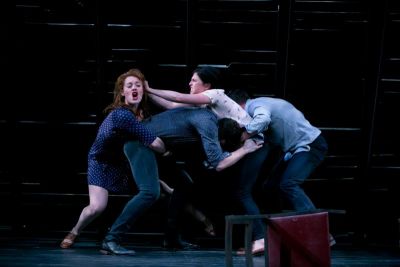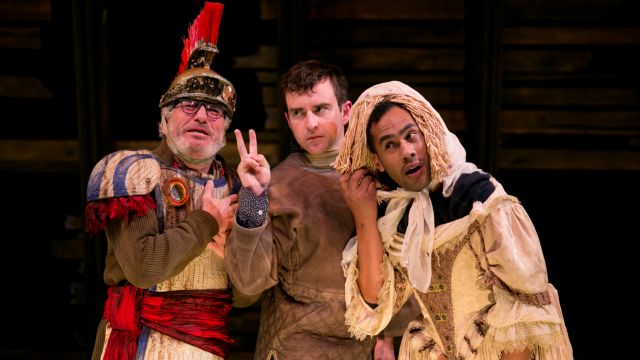The Dream
If every primary school-aged child were to see this production, we would have a generation of Shakespeare fans for all time, so wondrously witty and innovative is it. Bottom says, in Shakespeare’s words, “I have had a most rare vision.” Well so has Director Peter Evans; and those of us who only came to love The Bard in adulthood can only mourn the fact that Bell Shakespeare wasn’t around to inspire us in childhood.
Evans has taken A Midsummer Night’s Dream, one of Shakespeare’s earlier and lighter plays, and trimmed the fat, gristle-full, stringy parts to get to the eye fillet, the choicest cut of the meat. It’s an exquisite “butchering” that brings clarity of both speech and purpose while protecting the writer’s intent. Without the excessiveness of the all too frequent “padding” that Shakespeare’s plays inevitably suffer from (Elizabethans liked their entertainment lonnng….value for money) what emerges is a pure and delightful diamond that dazzles with beautiful language, warmth and magic.
 As with the recent, stunning production of Henry V, The Dream starts with a play within a play, and we meet the players at the first read of their play. It’s a marvellous first chance for us to “engage” with these characters, since so much of their involvement has been trimmed. In Bell Shakespeare fashion, the actors play multiple roles (with the exception of Julie Forsyth as Puck), dress in Op Shop rejects and gather what costumes they need from a clothes rack. These small devices make the play instantly contemporary and the language accessible.
As with the recent, stunning production of Henry V, The Dream starts with a play within a play, and we meet the players at the first read of their play. It’s a marvellous first chance for us to “engage” with these characters, since so much of their involvement has been trimmed. In Bell Shakespeare fashion, the actors play multiple roles (with the exception of Julie Forsyth as Puck), dress in Op Shop rejects and gather what costumes they need from a clothes rack. These small devices make the play instantly contemporary and the language accessible.
Teresa Negroponte has designed a set which defies description and suspends disbelief. It is, with merely the moving of a few slats, an old rehearsal room, a palace, the woods, fairyland. Part screen, part wall, part scaffold, it looks for all the world as though it’s been hastily put together from a demolished building, yet has stood forever and is showing the ravages of time. Certainly it requires imagination, but that is the glory of live theatre. Rachel Burke’s lighting design is stunning in creating atmosphere, Caitlin Porter is responsible for the excellent sound, and Nigel Poulton’s movement direction, including the best bitch-slapping cat fight I have seen on stage, is a veritable feast.
 But, apart from the superb direction, the greatest strength in this production is the cast. All are magnificent so nothing should be construed from the order in which they are mentioned.
But, apart from the superb direction, the greatest strength in this production is the cast. All are magnificent so nothing should be construed from the order in which they are mentioned.
When you think of Puck, you don’t imagine an aging woman with a funny walk, yet Julie Forsyth takes Shakespeare’s eternally youthful sprite and makes him her own. Full of tongue-in-cheek wry whimsy, she relishes every line and move and drives all other Pucks – from Mickey Rooney on film to John Kane in Peter Brook’s Dream – from memory.
Richard Piper uses that splendid voice of his to add extra pomposity to the boorish Bottom, and seems to channel Tommy Cooper as Pyramus in an hilarious version of the play. As Egeus he is both commanding and threatening…a force to be reckoned with. Ray Chong Lee plays two kings, Theseus and Oberon, as well as the simpering Flute. He too has a voice of astonishing quality, and when he whispers of hearing a mermaid singing on a dolphin’s back we are immediately transported to another world. He is young for the roles, but no less impressive because of that.
 Nikki Shiels is one of my favourites of the current crop of young actresses and she gives us a 21st century Helena. It’s the first time in perhaps 20 audience visits to this play that I have realised fully that, along with the in-your-face attitude, Helena is bruised and neurotic, a virtual stalker of Demetrius. Shiels inhabits the character like a second skin and her scenes with Lucy Honigman, an equally assertive Hermia, are so contemporary that we might be watching any scene in an urban nightclub between girlfriends vying for the same hotty. Their cat fight is a marvellous piece of staging.
Nikki Shiels is one of my favourites of the current crop of young actresses and she gives us a 21st century Helena. It’s the first time in perhaps 20 audience visits to this play that I have realised fully that, along with the in-your-face attitude, Helena is bruised and neurotic, a virtual stalker of Demetrius. Shiels inhabits the character like a second skin and her scenes with Lucy Honigman, an equally assertive Hermia, are so contemporary that we might be watching any scene in an urban nightclub between girlfriends vying for the same hotty. Their cat fight is a marvellous piece of staging.
Johnny Carr (Demetrius/Snout) and Gareth Reeves (Lysander/Mechanical) are suitably assured as the two male lovers and both possess great comic timing.

Janine Watson is a firefly…totally unrecognisable in the three roles of Hippolyta, Titania and Peter Quince; yet it is as Titania that she weaves magic and convinces us of Fairyland; and those scenes with Oberon create a real “other-worldy” feel.
It’s also due to Evans that the lines between the three worlds are clear for perhaps the first time in my memory. Fairyland, reality, and the play, all exist in time and space and although their boundaries cross each other, they never blur. Clarity is everything.
Some will say this is a dark vision, yet there seems to be new light shed on every area of the text. We are not distracted by un-necessary trappings and we do not need fairy costumes to tell us where we are. Dark maybe, yet this is also the funniest version of this delicious play that you will ever see. It’s a triumph for all involved and honestly deserves to be seen more than once. Please, please Bell Shakespeare, bring it back soon.
Coral Drouyn
Photographer: Lisa Tomasetti
Subscribe to our E-Newsletter, buy our latest print edition or find a Performing Arts book at Book Nook.

